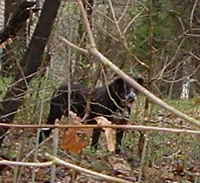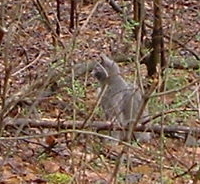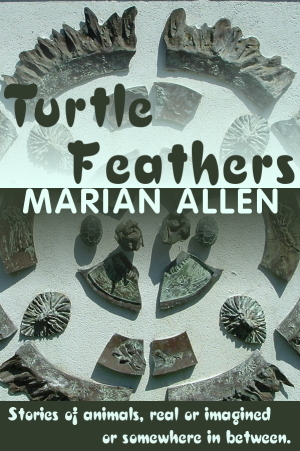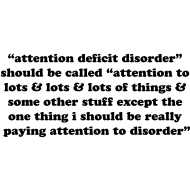Marian Allen's Blog, page 441
March 19, 2012
Floyd Hyatt in Shorts
Er, I mean, F. A. Hyatt is going to post today on the subject of short story forms and techniques. Next week, some examples. After that, we're into the April A-to-Z blogging challenge, in which I post every day on a topic that begins with subsequent letters of the alphabet. Sundays, other than April 1, are excluded, and I'll still be doing #SampleSunday.
Now here is Mr. Hyatt:
Short story techniques
F.A.Hyatt
It goes without saying that the shorter the story, the more focused the idea presented behind it needs to be. There is no extra space within the form for side plotting or rumination. However, beyond that, the form chosen for the presentation also becomes more important.
There are several forms a short story can follow:
One of my favorite forms is the Bow Tie. A bow-tie is a story whose ending connects back strongly with its first lines, or completes the initial idea presented. The shorter the length of the story, the more powerful this device is, because the reader maintains a fresher image of those starting words. This can extend the sense of a story, effectively using the opening twice, once to provide a hook to get the reader interested, and again as the object of the story, or its ending, for instance.
Another is the twist. This is in common use, where a situation becomes resolved in an odd or unexpected way. These are largely two-part stories. An initial situation is presented, then the situation is resolved in a non-intuitive fashion.
A third is the fable which, while partaking of the above forms, serves to provide an object lesson or moral, brought forward forcefully in the ending sentence or two.
A good short story should be a study in inference. You do not have a lot of words to play with, so depth, background, characterization, history and milieu usually need to be largely inferred; that is, these elements must tie to simple referents in the story that direct the reader's mind to imagine and fill in without needing much detail in the text.
For example, referring to a character's background as military, or wealthy, or a hobo directs the reader to think of him/her as a general type. The reader likely maintains an internal image of one, so that might be used, rather than detailing a history, or particular string of events. Sometimes this is sufficient, and can save space. Alternately, detailing only one scene that typifies the character's condition quickly works well. Finer definition rests in how you manipulate the character and his or her outlook during the story. If the story is set in the future, just one important-to-the-story feature, a particular device or activity that cannot be construed as other than futuristic, is sufficient. Limitations on the number of stages or backdrops used helps. Like a one act play, if the entire story can be played out in one location, that saves a lot of descriptive text, that can be then lavished on the telling of the tale.
In a sense, you need to work with the reader, draw upon some common pool of memory triggers, so that some of the story is "writ" by the reader, to extend the story. Like a crossword puzzle, the reader is asked to work his/her mind to achieve some of the story's goals. Because of this, the target audience needs to be carefully considered. I once wrote a short short that was basically a joke, but required some particular set of science awareness to get the point. It was either amusing or opaque depending on the reader's background.
While some amount of information dumping can (often must) be done for certain kinds of short stories, if the dump does not also achieve a particular advance of the story logic, or precurse its denouement, it is best to think closely about the audience. You are either writing to the wrong one, or adding unneeded information your audience should already know. In general, if you can preface even a short dump with the words "You see, what I mean is" or "You need to know that" or "About this time in history" fairly seamlessly, you need to rewrite it or direct the story to a more confined audience and omit it. Note I am not saying rewrite the information into the story. A dump is a dump. In a short story you won't often have the word count available to stretch it out within the prose. If the reader wants to know, needs it, provide it, and move on. Or write a different kind of story.
Now, these are devices, meant to save space without ruining the flow of a short. Some stories are nothing but the detailing of a personality, a vignette. Some are a still life, a picture of a scene in words. But, if you have a plotted story that needs to come in under, say, 2000 words complete, and three quarters to your goal you find yourself typing paragraph after paragraph of characterizations, scene elements, explanations and back-story, then look up to find your self at 5000 or more words, it can be helpful to look back at these elements.
If you are writing general fiction, this process is fairly easy to master, because your stories are set within a large frame of common experience to draw from. If you are writing genre short stories, this is much more difficult, because the common frame is small to non-existent. Inferring a genre world build will be an challenge. Still, it is done successfully every day, and is well worth mastering.
WRITING PROMPT: Take a well-known story — a child's tale or a fairy tale or a commercial — and write it in one of the forms above.
MA

March 18, 2012
#SampleSunday – SOME DISPUTED BARRICADE
I ran into Dave Mattingly, the Big Daddy of Blackwyrm Publishing, where I have a book in submission. He's more packed with work at the moment than my office is packed with really good stuff that I might need any second so I can't put it away. He said the book is in the queue, and should make it to the front for consideration in a month or two, which I figure means three. Maybe four. Six, to be on the safe side.
Hey, I'd rather be considered by a house that takes due deliberation with its projects than one that slap-dashes through everything, wouldn't you?
Anyway, here's an excerpt from the very beginning of SOME DISPUTED BARRICADE, the paranormal mystery in submission.
SOME DISPUTED BARRICADE — Excerpt
by Marian Allen
It was 1968. Like a lot of seventeen-year-old males that summer, I was thinking about death. Not Bobby Kennedy's or Martin Luther King's – I was contemplating my own. I could feel my eighteenth birthday looming and I had to wonder if I'd spend my nineteenth in Vietnam, in Canada, in jail, or in the Great Hereafter. It was nearly the last mentioned, and not at the hands of the VC, either. I came this close to having my goozle slit right here at home in good old nothing-ever-happens Faelin, Indiana. But that was later….
I tried for a basket and missed, trotted half-heartedly after the ball and caught it as it rolled to a stop against the fence. One good thing about playing alone on a day so hot the asphalt sucks at your sneakers: no razzing when you play like a stoned sloth.
The court ran along one side of the house, or Home or, as the Townies called it, The Orphanage. The official name was Faelin Municipal Children's Refuge, making me, I guess, a refugee.
The parking lot ran along the opposite side, which is why I didn't see the car that pulled in and parked. I wouldn't have supposed it had anything to do with me, even if I'd seen it; I'd long since given up any hope of adoption. As soon as I turned eighteen, I'd have to leave, anyway –probably go into the Service – probably try for the Navy. With my dark skin, dark hair, and dark eyes, I always kind of thought I'd look sharp in a white uniform.
I thought about that my last day at the Refuge, bouncing the ball across the court, not really practicing anything, just fooling around.
"Hey, Mitch!" I saw Jimmy Gassman's features pressed against the screen of our first-floor bedroom. Jimmy, my roommate, was ten, and a first-class pest. "Mrs. Brandt wants you to get cleaned up and go to her office. There's a lady in there!"
My heart did one of those flops like they talk about in True Romance comics. (Sometimes you get real desperate for reading material.) Like I said, I'd be leaving in a few months, and I'd been at the Refuge all my life; nobody had ever even taken me home for a month's free trial, but I'd never given up hope. Kids can be so dumb. I mean, the cops found me in a dumpster. With my coloring, there was some speculation that I might not be white. Nobody in small-town Middle America in those days was going to adopt a kid who might not even be white. Things were changing by 1968, but trust me to miss the benefit.
Anyway, I tossed the ball into the equipment shed and sprinted to the bathroom. No time for a shower. I slopped off the smell with a washcloth at the sink and darted into the bedroom for a change of clothes.
Jimmy still had his face smooshed against the screen, humming loudly. He said it tickled his lips.
"Cut it out," I said, pulling on a clean tee and buttoning my good Madras shirt over it. "You'll get lead poison or something. That screen's dirty."
"I washed it," he lied.
I hesitated between my pegged jeans or my new bell-bottoms. I decided to go with the more conservative look, and squeezed my feet through the older jeans and into my loafers. Thank God, I thought, for Trinity Episcopal Sunday School's Dorcas Class, who had chosen the Refuge as their "mission" for the year. They tended to concentrate on the younger kids, but one of the members was a male clothes horse, and he'd passed me some pretty cool threads.
"Better hurry, before she changes her mind," Jimmy mumbled, without taking his mouth off the screen.
I shook some Barbasol onto my hair and combed it back. Mrs. Brandt was with-it enough to let me wear my hair as long as I wanted – half-way down my ears – but she insisted I keep it neat. I could live with that.
I peered into the mirror. Did I need a shave? No, but maybe in a couple of days.
"Hope you like the taste of bug guts," I said, on my way out of the room. "Notice, if you will, the fly swatter on the floor under the window…."
WRITING PROMPT: Recreate a day or a feeling or an activity from when you were seventeen.
MA

March 17, 2012
You're Not Alone In The Woods
Sounds creepy, doesn't it? But it's really rather annoying.
 I've gotten used to our dog coming with me. Charlie wants him to, on the grounds that the big gallumpher will warn any lurking serpents away from my path. That might happen. If they don't run away from his lumbering, they'll run from my screaming, "Don't step on any mushrooms! Don't sit on any, either! Especially don't sit on any!"
I've gotten used to our dog coming with me. Charlie wants him to, on the grounds that the big gallumpher will warn any lurking serpents away from my path. That might happen. If they don't run away from his lumbering, they'll run from my screaming, "Don't step on any mushrooms! Don't sit on any, either! Especially don't sit on any!"
Now, my cat has decided to come, too. I never would have thought that little miss priss would come out into the woods, but, now that I think of it, that's exactly what Aunt Rose said when I moved over here.

I can tell you one thing: If I tripped and fell and cracked my head, there wouldn't be any of that, "Timmy's down the well" stuff going on. Joe would probably go back to his dog den in the potting shed and take a nap, and Katya would be all, "Who says there's no such thing as a free lunch? OM nom nom nom!"
So I did find some mushrooms. Our friend, Daniel Scott, just called to tell me he found a BIG PATCH of morels. I was like, "Oh, how lovely for you!" Inside, I was going, "Lord, deliver thou me from the Deadly Sin of Envy. Thou didst already deliver me from the Deady Sin of Gluttony by NOT LETTING ME FIND A BIG PATCH, myself. So, thanks for that."
I did find some, though. Can you find two in this picture, without enlarging it?

Click to open larger in a new window
Now, if you'll excuse me, I'm going to go look at Daniel's Facebook pictures of his haul. All joking aside, I'm delighted to have another happy thing to share with a friend. 
WRITING PROMPT: What are you doing in the woods?
MA

March 16, 2012
Friday Recommends – Booksellers and Badgers
 As I said yesterday, I'm going to That Book Place tomorrow for the Author's Fair. It seemed like a good time to recommend some independent booksellers, online and off.
As I said yesterday, I'm going to That Book Place tomorrow for the Author's Fair. It seemed like a good time to recommend some independent booksellers, online and off.
That Book Place is in Madison, Indiana. They sell new and used books. They also have their own imprint, Hydra Publications. Great people to know, to shop with, and to work with.
Arlston's Booksellers is in Corydon, Indiana, on the Square. New books, with a shelf or two of gently used ones. They also have an section of small antiques and collectibles. The blackboard behind the counter shows how far it is from Arlston's to the big-box stores in Louisville. While the Sherman Minton bridge was out, the board said, "You can't get there from here." heeeee! They've been pals of mine for many years before they opened the store. Locavores. Love 'em!
Destinations Booksellers is in New Albany, Indiana on Spring Street, not far from the I-64 interchange. Always an interesting variety of books and book-related merchandise. You can even rent textbooks there. How cool is that? Very involved with the local scene, active in bringing in local and nationally renowned artists and authors.
Carmichael's is in Louisville, with more than one location. AND they sell eBooks, so yay Carmichael's! As with all independent booksellers, they're very involved with what's happening around them.
Indiebound is your online portal to indie bookstores. It's a super-nifty site. It has a list, sorted by state, of indies that sell eBooks. Not just a bookstore portal, IndieBound has a search function to find independent stores of all kinds, including arts and crafts, yarns, toys, foods and more. Awesomesauce!
Now badgers. I had lunch with Jane yesterday, and she suggested I post a link to the honey badger video. I'm addicted to Randall, aren't you? Anyway, I must warn you that Randall's language isn't always everything my mother would prefer. Here are my favorites of his videos so far. The honey badger, the sea otter, and the armadillo. Don't pollute, stupid!
While I'm on the subject of animal videos, Jane pointed me to this one of a kung fu bear. As Randall would say, crazy!
Well, I must go and dance between the raindrops, gathering wild mushrooms like a 200-bound fairy maiden. Or maybe that's after I've had the mushrooms….
WRITING PROMPT: Does your main character own any books? Lots, or just a few? Any favorites? Write about a character who doesn't have any books visiting the home of one who has a lot of them, or vice versa.
MA

March 15, 2012
Author's Fair
No, that isn't a lukewarm book review. That's where I'll be on Saturday: at the Author's Fair in Madison, Indiana, a shebang thrown by That Book Place.
 That Book Place is a wonderful new-and-used independent book store. It's all in one big room, so you don't get lost in a rabbit warren of wonder, as you do in some book stores. Getting lost in a book store has its own charm, but the charms of That Book Place include knowing where the door is, being able to check out all your fellow shoppers at the same time, the seller on duty being able to direct you to the section you want by remote control ("Next section. Now turn to your left. Your other left. Top shelf. Got it? Good!) and the possibility of a big group conversation with everybody in the store pitching in.
That Book Place is a wonderful new-and-used independent book store. It's all in one big room, so you don't get lost in a rabbit warren of wonder, as you do in some book stores. Getting lost in a book store has its own charm, but the charms of That Book Place include knowing where the door is, being able to check out all your fellow shoppers at the same time, the seller on duty being able to direct you to the section you want by remote control ("Next section. Now turn to your left. Your other left. Top shelf. Got it? Good!) and the possibility of a big group conversation with everybody in the store pitching in.
So the Southern Indiana Writers, including Yours Truly, will be there on Saturday, St. Patrick's Day. We'll have our anthologies and I'll have CDs of my novels and short story collections.
Here's a link to the Author's Fair page at That Book Place so you can see who-all will be there. If you're in the neighborhood, drop by and say hello. And buy a buncha books! 
WRITING PROMPT: Do you prefer an open shop, or one with stairs and rooms-off-of-rooms and cubbyholes? A shop, now, now a private home.
MA

March 14, 2012
Rutabaga — YES, RUTABAGA
Rutabaga always makes me think of , an actress I much admired. Not that there's any physical resemblance; it's just, you know, the name.
ANYWAY, I said yesterday at Fatal Foodies that I would post on my blog today about roast rutabaga. A tempting topic, yes?
Rutabagas look a lot like turnips. They taste a bit like turnips, too, but stronger. I've been trying to expand my root vegetable appreciation beyond potatoes and carrots, and have come to love turnips and parsnips, so I decided to give rutabagas a try.
I bought one as big as my head. Well, yes, that's a lie, but it was bigger than my cat's head, and that's the truth! It was too big, actually, because I cut it in half and that was enough for Charlie and me (grammatically correct).
Here's how:
ROAST RUTABAGA
 rutabaga (duh), peeled and cubed
rutabaga (duh), peeled and cubedsalt & pepper to taste
sugar, maple syrup or agave or something sweet
olive oil
Cut the rutabaga into cubes. Toss with oil and seasoning and a bit of sweet. Roast at 400 for 30 to 60 minutes or until tender. This big boy was tough, and could have cooked longer than the 45 minutes we gave it. Smaller, more tender ones would cook faster, even with the cubes being the same size as I cut.
I still have the other half, so we'll have that another time. I may boil the beast first and THEN roast it.
It was pretty good, actually. I look forward to trying it with fresh rutabaga from the farmers' market this summer.
WRITING PROMPT: A character tries something new and isn't entirely successful. Does he or she try again or consider the attempt a dead loss?
MA

March 13, 2012
Project X = TURTLE FEATHERS
I've been working on The Project, and I've come to think of it as TURTLE FEATHERS. It has turtles in it, and it has birds in it, so….
 Here is the cover. Whaddya think? I think it's kinda snazzy-jazzy.
Here is the cover. Whaddya think? I think it's kinda snazzy-jazzy.
The background picture is one I took of a mandala on a wall at Mount St. Francis in southern Indiana when I was there on a writing retreat. It has two little turtles right in the middle, and the rays on the outside look kind of feathery. I looked around the internet for a picture to use, but nothing struck my fancy, so I browsed my own and came up with this one.
In other "news", I went on my first mushroom foray yesterday. I found three, which I post about cooking today at Fatal Foodies. I hope three isn't all I find this year but, if it is, they were worth it. I love free food.
WRITING PROMPT: Grab two books at random. Open them at random and plop your finger down on the pages at random. Take the words you're touching (or, if the words are generic, the words nearest) and put them together. Come up with a story idea that connects them.
MA

March 12, 2012
Floyd Hyatt Does the Disc
Now we come to my favorite "light" fantasy series: Terry Pratchett's Discworld!
Let's hear what F. A. Hyatt has to say about it.
DISCWORLD Series
(Over thirty titles to date, including The Color of Magic, Equal Rites, Guards! Guards!, Soul Music, Interesting Times, The Truth, Night Watch, Going Postal, Thud!, many others.) Harper Collins pub.
Author: Terry Pratchett
Very much in the vein of Douglas Adams, The Disc World series is pure British Humor set to fantasy. Three of his books have been produced as multipart films for English television, and at least one reinterpreted as a video game. A few drawing table graphic picture books are also marketed.
Having developed a flat earth carried through space on the backs of elephants and run by magic, Pratchett moves his cast of odd characters through a series of novels, each focused on some aspect of the discworld, as seen through one or two lead character's perspective. The foibles of human nature, institutions, and beliefs are logically examined and ground fine under the acerbic and unstoppable wit of Pratchett. Known for his sub-text gags, colorful writing and thoughtful plots, his work in this series has been compared with Geoffrey Chaucer's.
The books in this series need not, and benefit only little, by being read in any particular order. They are chronologically written, but all revolve around a stable of about seven major characters who walk in and out of the various stories, each of which tries to "star" one of his majors. There are several new character introductions during the progression of the series, but, once introduced, they remain to haunt future volumes as cast members.
Witty, well-crafted, belly-laugh-producing adventure-style fantasy, there is no attempt to "Cliff-Hang" or produce multi-volume-spanning plots. Each work in the series stands on its own.
Excellent, singular fantasy, and superb humor.
Agreed, on all counts, although Pratchett's books have become less humorous and more "realistic", like his most recent, SNUFF, in which The Dark in Sam Vimes casts a noir pall over everything, and the book's running gag — and I use the word advisedly — is Young Sam's devotion to the study of poo.
WRITING PROMPT: Someone known for being funny loses the comic view of life.
MA

March 11, 2012
#SampleSunday – Bel Goes AWOL
I have many projects underway and I overslept this morning (thanks, Daylight Savings Time–thanks heaps), so here's another glimpse inside the world of FORCE OF HABIT (99 cents and cheap at the price):
Bel, meanwhile, crossed the lobby to the Inn's front entrance.
She heard the barroom door open and checked to make sure Wotan Hessaphess wasn't following her. No, only a Stokk, a slick-looking snappy dresser with Kelly green hair and lemon yellow skin. She smiled at him, and he smiled back, his lipless mouth showing his good teeth to advantage.
Bel went into the vestibule. From here, she could look through the Inn's glass front into the street.
The brochures didn't exaggerate: The city was beautiful. The buildings squatted and lumped, then soared into towers and minarets, their peaks lost in low clouds.
And the colors. Pastel was an insipid word for such vibrant tones, for architecture like an endless cluster of soap bubbles.
The Stokk came into the vestibule, too.
He seemed about to speak to her. Bel didn't want him to speak to her; him, or anyone else. She wanted to be left alone, to look and enjoy.
She frowned and shook her head, and went out.
Out, into the street, where she had no business being.
Bel took a deep breath of the unfamiliar air. It had a different taste than Terran or shipboard air, different smells; it even seemed to have a different texture.
She could go to the corner without violating directives…too much. She could go to the corner and stand there for a few minutes, people-watch a little, then go back, and none the wiser.
A food vendor on the corner offered a soup made of fish and wine, and tiles made of dried meat spread with herbed cheese.
Bel bought and ate some, and washed it down with carbonated fruit juice bought from another vendor on the far corner. Still on the same block as the hotel, you see, just outside the walls; a mere eight inches or so from where she ought to be; practically still inside.
And so the adventure begins. Ah, Sophistry, thou plausible but misleading or fallacious argument, how thou dost make puppets of us all!
WRITING PROMPT: Pick a character from your work or from literature, film or television and have him or her attempt to justify an unjustifiable action.
MA

March 10, 2012
Why I Have to Outline
Because my brain doesn't work right. This article says that the way my brain works is good for solving problems. Thinking outside the box. Connecting things in ways one doesn't ordinarily connect them. This is a good thing in many ways. It's a good way to be creative.
But it's also like this, although I don't have ADD. Or maybe I do.
When I start thinking about a story, I just mess around playing computer card games or pinning stuff on Pinterest or hunting mushrooms or cooking or whatever, free-associating with whatever started the story in the first place. It's a little like the time after the big bang — remember? — when atoms coalesced and, the next thing you knew, there were stars and stuff? 'Member?
But shiny isn't the same as story. All that stuff has to be put in some kind of order. Even stories in which things are shuffled around had to be put in order before they were shuffled. William Faulkner knew exactly the order in which things happened when he wrote "A Rose For Emily". Virginia Woolf didn't just hop from one point of view to another at random. James Joyce didn't just ramble in his narrative.
So outlining. That's the part I hate about writing. You have to catch all your happy little fish and rabbits and hummingbirds and write choreography for them and teach them the routine. If you're lucky, you end up with the Rockettes. Or at least Rocky Horror.
Outlining is telling all the sparkly possibilities that don't fit that they can't be in the show. Outlining is, to continue the choreography metaphor, A Chorus Line. I only wish my outlines came out as well as that.
WRITING PROMPT: What do you dislike most (or like the least) about writing?
MA






